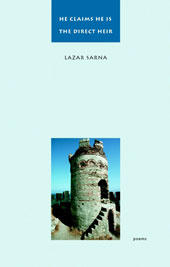The Porcupine's Quill
Celebrating forty years on the Main Street
of Erin Village, Wellington County
BOOKS IN PRINT
He Claims He Is the Direct Heir by Lazar Sarna
‘Most of Sarna’s poems are humorous and earthbound, but he can soar when he wants to.’
Lazar Sarna’s He Claims He Is the Direct Heir introduces a new tone of voice into Canadian poetry. It is wry and droll, an unexpected melange of Jewish humour and Surrealism. Sarna’s terse lyrics often have the crackle of a good joke, though usually with grim undertones. The voice often grates and is surprisingly scratchy but then, a covert lyricism breaks through. In his best poems, which jar like a wisecrack at a shiva, he seems to be jesting through gritted teeth. His world is at once homely and weird; its oddity unsettles just because we know it so well.
Praise for his breakthrough novel The Man Who Lived Near Nelligan, stemmed from Sarna’s ability to capture the odd, the sharp and the humourous in what appears to be ordinary. He Claims He Is the Direct Heir, a mouthful of a book title, tells the reader about the richness of heritage through some of the freshest and most playful images the author has yet concocted. Trained as an attorney, Sarna skillfully populates his poems with scribes on strike, unsung trianglists, Herzl’s beard, a ‘family of worries’ and a ‘Mother who was a jagged top of a can’. We see them struggling, loving, resisting and expecting to inherit what is there and what is not. This is a voyage of the exotic right at home.

2006—A M Klein Prize,
Shortlisted
Review quote
‘Lazar Sarna is a quite unique and distinctive voice in Canadian poetry. Tinged with a blend of Jewish humour and surrealism, the lyrics are often as impressively original as they are strikingly memorable with a cadence all their own.’
—Midwest Book Review
Review quote
‘In his adumbration of large themes and in the morality -- not to be confused with moralism -- of his poetry, Sarna is that rare, perhaps anachronistic, thing in an age of personal expression, cursory impressions, moral relativism, and ironic distance: a poet who wears the mantle of a prophet. That he wears it uneasily and speaks with dry humour makes his words all the more convincing. He is indeed the direct heir of something grand and important.’
—Zach Wells, Quill and Quire
Review quote
‘These standout poems are not simply highlights in a mixed-bag, however. Instead, they serve also as the accessible entry ports into Sarna’s more surreal and difficult pieces. By moving back and forth between the confounding and the clear, the whimsical and the concrete, each type of poem encourages the reader to try the next. In reading through this book, I found myself intrigued by poems I would have never given a second thought to otherwise, and discovering new depths in poems I had immediately been drawn to.’
—Rob Taylor, poetryreviews.ca
Review quote
‘There is a wryness to Lazar Sarna’s He Claims He is The Direct Heir that is hard not to like, though it can be slippery. If Jackie Mason had become a rabbi, he might have wisecracked a line like ‘‘You wouldn’t like the beans they serve here. / I counted them for you’’ (from ‘‘I Waited For You’’), and a more embittered Wallace Stevens might have announced ‘‘No one is actually on the shore / to greet sea-crashed men, / except the shore.’’ Perhaps, then, the book’s title is a hint that this is something of a ventriloquist act: these poems, which occasionally adopt instructive and even prophetic overtones, are words thrown from an unknown distance by unknown parties. Wit comes in small, neat parcels (‘‘Depending on where you stand / the firing squad is a team effort, / fresh air, rah-rah’’) that will probably be too small and neat for some, but this is a book better dipped into than read straight through. It is definitely a gathering of occasional pieces, with the unevenness such a gathering almost invariably entails but, too, a good deal of rough-edged poignancy.’
—Tim Conley, Canadian Literature
Lazar Sarna was born in Montreal, Canada where he currently practices law. He is the author of the poetry collections The Singsong (Canada House, 1968), Mystics on a Picnic, (Hillel, 1972) and Letters of State, (Porcupine’s Quill, 1978), as well as two novels, The Man Who Lived Near Nelligan and Book Bin Baby. His poetry has appeared in the anthologies Cross Cut (Vehicule, 1982) and Jerusalem (Vehicule, 1996), and has been published in Antigonish Review, Canadian Forum, Canadian Literature, Descant, Fiddlehead, and Prism International.
The Porcupine's Quill would like to acknowledge the support of the Ontario Arts Council and the Canada Council for the Arts for our publishing program. The financial support of the Government of Canada through the Canada Book Fund (CBF) is also gratefully acknowledged.





